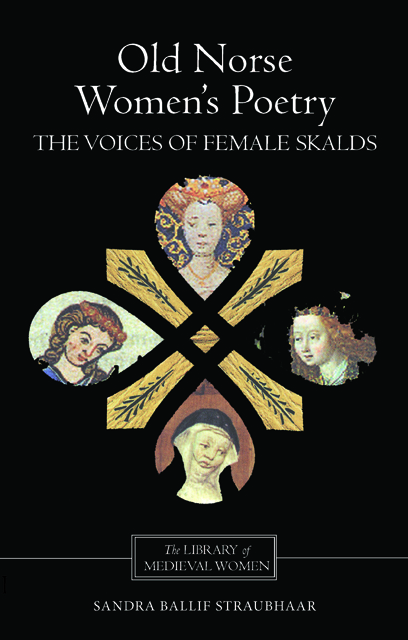Book contents
- Frontmatter
- Contents
- Foreword
- Abbreviations
- Introduction
- I. Real People, Real Poetry
- II. Quasi-Historical People and Poetry
- III. Visionary Women: Women’s Dream-Verse
- IV. Legendary Heroines
- V. Magic-Workers, Prophetesses, and Alien Maidens
- VI. Trollwomen
- Old Norse Literature Time Line
- Glossary of Personal Names
- Bibliography
- Index of Names
- Library of Medieval Women
I. - Real People, Real Poetry
Published online by Cambridge University Press: 14 February 2023
- Frontmatter
- Contents
- Foreword
- Abbreviations
- Introduction
- I. Real People, Real Poetry
- II. Quasi-Historical People and Poetry
- III. Visionary Women: Women’s Dream-Verse
- IV. Legendary Heroines
- V. Magic-Workers, Prophetesses, and Alien Maidens
- VI. Trollwomen
- Old Norse Literature Time Line
- Glossary of Personal Names
- Bibliography
- Index of Names
- Library of Medieval Women
Summary
This first section contains poetry found in the historical sagas of the Norwegian kings, the Icelandic family sagas, and the thirteenth-century saga of contemporary events, Sturlunga saga. The ordering of the entries is based on the chronological sequence of the recounted events, irrespective of saga dating.
With the exception of the thirteenth-century ‘Kerling í Tungu,’ the skáldkonur (women poets) of this section date from the ‘Viking Age,’ the early days of Iceland’s settlement. Three are Norwegians and the rest Icelanders. All nine of these poets use the traditional and complex dróttkvætt (court meter) form (see Introduction), with the possible exception of the epigrammatists Þórhildr and Auðr. (Two-line epigrams, kviðlingar, can be metrically ambiguous, because of the brevity of the sample.) Dróttkvætt as we usually encounter it was used commonly in the courts of kings, often in a kind of extemporaneous verse-repartee between a king and the members of his household. Indeed, John Lindow has suggested that dróttkvætt may have been intended as a secret code language for the exclusive fraternities of housecarls and courtiers surrounding the various Viking-Age kings. If this were the case, then it is a particular credit to our skáldkonur here that they seem to have had no trouble with spontaneous composition in dróttkvætt, considering that they probably were not entitled to membership in one of these fraternities. (There is some ambiguity, however, in the case of Jórunn [see below], who does seem to have been a commissioned court poet and who would have been, therefore, familiar with court lore and procedures.)
Readers are encouraged to consult the Glossary of Names at the back of the book for further background on the various personalities.
Hildr Hrólfsdóttir nefju
Around 900, Norway
Snorri Sturluson, Heimskringla: Haralds saga hárfagra, ch. 24
FJ IB, 27; Kock I, 17
SPSMA (ed. Kari Ellen Gade):
http://skaldic.arts.usyd.edu.au/db.php?table=poems&id=264
Hildr asks King Haraldr Fairhair why he has sent her son, Gǫngu-Hrólfr, into exile
Much of this stanza’s verbal cleverness is dependent upon knowing that ‘Hrólfr,’ which is both the name of the exile referred to and the name of his (namesake) maternal grandfather (Hrólfr Nefja, or Rolf the Nose), is a compound of hróðr (‘fame’) and úlfr (‘wolf’).
- Type
- Chapter
- Information
- Old Norse Women's PoetryThe Voices of Female Skalds, pp. 11 - 22Publisher: Boydell & BrewerPrint publication year: 2011

